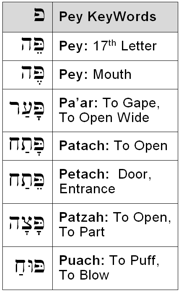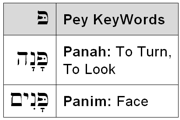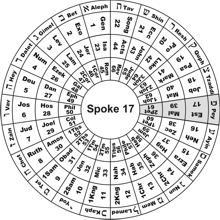The Mouth of God
The law of truth was in his mouth (pey), and iniquity was not found in his lips:
he walked with me in peace and equity, and did turn many away from iniquity. For the priest's lips should keep
knowledge, and they should seek the law at his mouth (pey): for he is the messenger of the LORD of hosts.
Malachi 2:6f (Spoke 17, Cycle 2)
 The name of
the Seventeenth Letter signifies the mouth, the organ of speech. God used it as a KeyWord in three Alphabetic
Verses, two of which are followed by the closely associated KeyWords patach and pa'ar, both translated as open: The name of
the Seventeenth Letter signifies the mouth, the organ of speech. God used it as a KeyWord in three Alphabetic
Verses, two of which are followed by the closely associated KeyWords patach and pa'ar, both translated as open:
- AV Ps 37:30 The mouth (pey) of the righteous speaketh wisdom, and his tongue talketh of judgment.
- AV Prov 31:26 She openeth (patach) her mouth (pey) with wisdom; and in her tongue is the law of kindness.
- AV Ps 119:131 I opened (pa'ar) my mouth (pey), and panted: for I longed for thy commandments.
The alliterative repetition1 of Pey KeyWords emphasizes and amplifies its
symbolic meaning by showing how this Letter links related ideas. This is very common in the
Alphabetic Verses as seen, for example, with Bet, Tet, and Tzaddi (BW book, pgs 138, 223, 326).
God also used the verb patach (to open) and its associated noun petach (entrance) as KeyWords in two other Alphabetic Verses:
- AV Ps 145:16 Thou openest (patach) thine hand, and satisfiest the desire of every living thing.
- AV Ps 119:130 The entrance (petach) of thy words giveth light; it giveth understanding unto the simple.
Christians are familiar with patach through its Aramaic cognate preserved in Mark 7:34:
"And looking up to heaven, he sighed, and saith unto him, Ephphatha, that is, Be opened." This
word uses the soft Phey –  – that sounds like "f" or "ph."
It is distinguished from the hard Pey – – that sounds like "f" or "ph."
It is distinguished from the hard Pey –  – by the dot (dagesh) in the center.
This Letter is also one of the five that take an alternate final (sofit) form – – by the dot (dagesh) in the center.
This Letter is also one of the five that take an alternate final (sofit) form –  –
when written at the end of a word. –
when written at the end of a word.
The hard Pey is called a plosive because its sound is made by suddenly bursting open the lips to release the
pressure behind them. Its elementary power is clearly displayed in the KeyWord puach (puff, blow).
Both it and its translation puff are onomatopoetic (they sound like what they describe). This sets
the tone for many of the prominent themes of Spoke 17, most notably the prophecies of the Parousia, the
Coming of the Lord. The idea of opening is amplified yet again in another KeyWord that God used twice in conjunction
with pey:
- AV Lam 2:16 All thine enemies have opened (patzah) their mouth (pey) against thee:
- AV Lam 3:46 All our enemies have opened (patzah) their mouths (pey) against us.
Note again the alliteration of Pey KeyWords, including the name of the Letter itself. Almost all occurrences of
patzah, (twelve out of fifteen, or 80%), describe opening the mouth. Its first appearance is in conjunction
with pey and another very important KeyWord – panim (face) – when God cursed Cain after he had
murdered his brother:
And now art thou cursed from the earth, which hath opened (patzah) her mouth (pey) to
receive thy brother's blood from thy hand ... And Cain said unto the LORD, My punishment is
greater than I can bear. Behold, thou hast driven me out this day from the face (panim) of the earth;
and from thy face (panim) shall I be hid (essater); and I shall be a fugitive and a vagabond in
the earth; and it shall come to pass, that every one that findeth me shall slay me.
Genesis 4:11ff
 Cain's
cry that he would be hid from God's face is an essential key to the Book of Esther.
The verb translated "I will be hid" – Cain's
cry that he would be hid from God's face is an essential key to the Book of Esther.
The verb translated "I will be hid" –  (essater) – is spelt with exactly the
same Letters as (essater) – is spelt with exactly the
same Letters as  (Esther), differing only in two vowel points. As an aside,
this exemplifies the Aleph Prefix as the sign of "I will" (BW book pg 125, or see
the online review of Alphabetic KeyWords for Aleph).
The name of the Book of Esther therefore points directly to one of its most prominent features – it contains no mention of
God whatsoever! This is very rare feature, found in no other Book except the Song of Songs, and is one of the reasons
its inclusion in the Canon was strongly debated. As we shall see, God's apparent absence is an essential aspect
of Esther which He designed to demonstrate His providential care even when He seems to be absent,
"hiding His face" as it were. [This is an example of the overwhelming power of the Bible Wheel to explain long-standing controversies
about the Canon - see Apocryphal Additions to Esther Excluded.] (Esther), differing only in two vowel points. As an aside,
this exemplifies the Aleph Prefix as the sign of "I will" (BW book pg 125, or see
the online review of Alphabetic KeyWords for Aleph).
The name of the Book of Esther therefore points directly to one of its most prominent features – it contains no mention of
God whatsoever! This is very rare feature, found in no other Book except the Song of Songs, and is one of the reasons
its inclusion in the Canon was strongly debated. As we shall see, God's apparent absence is an essential aspect
of Esther which He designed to demonstrate His providential care even when He seems to be absent,
"hiding His face" as it were. [This is an example of the overwhelming power of the Bible Wheel to explain long-standing controversies
about the Canon - see Apocryphal Additions to Esther Excluded.]
The KeyWord panim (face) is from the root panah (turn, look) in the sense that you
see the face when someone turns to look at you. It is evident in the name Peniel (Face of God) that Jacob
coined after he wrestled with God, saying "for I have seen God face to face" (panim el panim, Gen 32:30).
God used these KeyWords in five Alphabetic Verses:
- AV Ps 25:16 Turn (panah) thee unto me, and have mercy upon me; for I am desolate and afflicted.
- AV Ps 119:132 Look (panah) thou upon me, and be merciful unto me, as thou usest to do unto those that love thy name.
- AV Ps 119:135 Make thy face (panim) to shine upon thy servant; and teach me thy statutes.
- AV Ps 34:16 The face (panim) of the LORD is against them that do evil, to cut off the remembrance of them from the earth.
- AV Lam 4:16 The face (panim) of the LORD hath divided them; he will no more regard them: they respected not the persons of the priests, they favoured not the elders.
The most frequent use of panim is in its construct state פני(p'nei, face of) with the
Lamed Prefix - ל - the sign of the prepositions to or for (BW book pg 247,
or see the online review of the Alphabetic Verses for Lamed),
to form לפני (liphnei) which literally means "to the face of" and
is usually translated
as "in front of," "before," "towards," or "in the presence of." The frequency of this word is greatly
maximized in Esther where it plays an essential role in the overall
structure of the story which begins with Vashti's
refusal to show off her beauty "before (liphnei) the king ... the people and the princes" (vs 1:11),
and climaxes when Esther boldly, and at her own peril, presents herself "before (liphnei) the king" to
save her people from destruction (vs 8:4), as discussed at length in Esther: The Hidden Face of God.
Note 1: As often happens, the original word order was lost in translation.
The alliteration is seen in the transliterated Hebrew which begins in both cases with conjugations of the
KeyWord pey, and reads Piah petach (Her mouth she opens) and Pi pa'arti (My mouth I opened). The word
piah is the construct form of pey suffixed with the Fifth Letter Hey to signify the feminine possessive, her
mouth. Likewise, the word pi is the construct form of pey suffixed with Yod to indicate first person possessive,
and pa'arti is the first person qal perfect conjugation of pa'ar (open).
Note 2: This article is essentially identical to pages 305-306
of the Bible Wheel book. It lays the foundation for the primary themes that link
all three Books on Spoke 17, most notably the
hiddenness of God in the Book of Esther.
|



